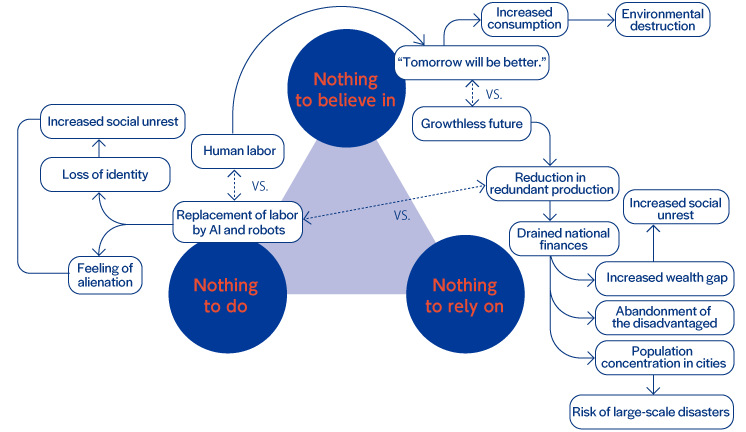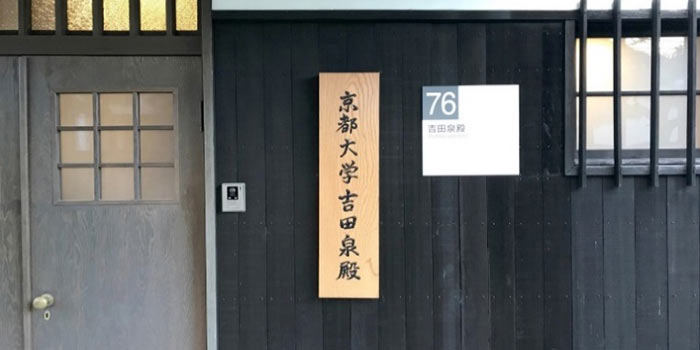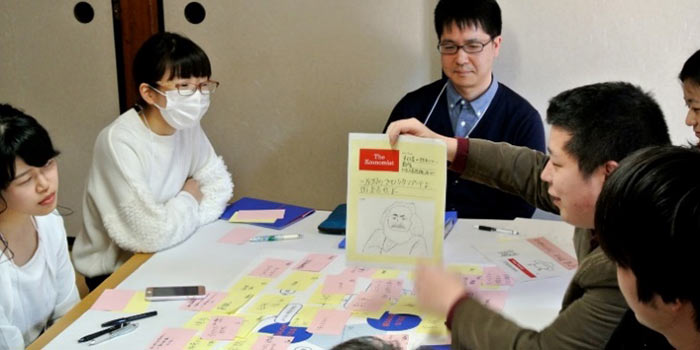 :
:

Let's say we live in the year 2050. What societal issues are we facing?
Aging society? Declining birth rate? Depopulation? No. These are not societal issues, but phenomena that we need to face and accept. A societal issue arises when the phenomena threaten our essentials, such as lives, properties, rights and identities and raise fear in us.
How do the phenomena threaten us?
We talked to professors in Kyoto University and gave it a lot of thought. The discussions with the professors specialized in primatology, taxation, ancient Roman history, human emotions, South East Asian studies and African studies superficially seem unrelated to the societal issues that Japan will be facing, but we found that they are all related to constant fear that people have been suffering. "Crisis 5.0" summarizes the potential crisis that we are going to face in the future.
Main points of the interviews / Researcher interviewees
Main points of the interviews

Researcher interviewees from Kyoto University (in no particular order; titles omitted)
| Name | Research area | Interview |
|---|---|---|
| Juichi Yamagiwa | Primatology |
|
| Carl Bradley Becker | Symbiotic anthropology |
|
| Toru Morotomi | Economics |
|
| Yasuyuki Kono | Southeast Asian studies |
|
| Yukiko Uchida | Emotion, happiness |
|
| Takashi Minamikawa | Ancient Roman history |
|
| Masayoshi Shigeta | African studies |
|
| Masaaki Okamoto | Southeast Asian studies |
|
- These interviews were conducted during the period from November 2016 to February 2017.
Juichi Yamagiwa
President of Kyoto University
Interviewer: Hitachi Kyoto University Laboratory, Hitachi, Ltd.
Human Society: Countering Fear
Just like horses, monkeys, and gorillas, which form groups in which each member of the group has their own position, human beings formed societies before the birth of language. The essence of society that was formed at that time is still alive today.
Why did human beings form societies? The answer is this: to counter and overcome their fear of death and of other people. The most significant difference between human and animal societies is the belief in the future which irreversibly arose in human society as the result of settlement and agriculture.
Agriculture can be regarded not only as a revolution in cultivation techniques, but also as a guarantee of irreversible change. Settlement and agriculture-that is, investment in the future-require much more strenuous labor than hunting and gathering. This cannot be achieved without believing in the future.
Belief in the Future
For the sake of belief in the future, or the belief that tomorrow will be better than today, people endure today's hardships and work for tomorrow. Human beings developed the mindset of working hard today to overcome our fear of the future.
Next, human beings developed the mindset of moving to other areas to reap greater rewards. Societies based on this mindset, from ancient empires to modern countries, have been organized as nations with the goal of protecting the interests of their citizens.
However, as the power of global enterprises increases in today's information society, the independence of nations is becoming more and more uncertain.
Fear in Societies in Which People Have Less Need for Others
With the development of civilization, we have created safe societies that shield people from the fear of death and the fear of other people. As a result, it is possible to live in modern society without interacting much with others. However, in contrast to the self-sufficiency of the hunter-gatherer era, our society requires people to constantly rely on others without having any actual relationship with them.
One of our most significant problems today is that people in society have become distant from each other, resulting in decreased awareness of the existence of others. While the development of civilization sought to eliminate fear, people in recent years find their fears growing.
Although trusting in and investing in the future makes it possible to alleviate our immediate fears, other vague fears grow ever larger. These new fears then lead to the next stage of progress, and this cycle serves as the driving force behind the development of human society.
Human beings have traditionally considered this cycle to represent growth, although recent acceleration of this cycle has widened the gap between the sensibilities obtained before human beings were socialized and those that we acquired during the hunter-gatherer era.
 :
:

"Believing in the Future."
Human beings take action based on trust in the future.
However, this belief in the future, which gives meaning to raising children, making money, and other aspects of life, is becoming more difficult.

The greatest revolution that resulted from agriculture was the newfound ability of human beings to believe in the future and to start investing in the future in the form of planting seeds.
This spirit has been passed down as the idea of capitalism, leading to today's society, which continues to grow through a cycle of production and consumption backed by investment.

So, up to this point, what kind of futures have people believed in?
For instance, during the ancient Roman era, a way of thinking took root in the ruling classes throughout the Roman Empire. This thinking was "Hard work makes you civilized, and hard work makes you Roman."
This mindset enabled the empire to operate.

During the Meiji Period in Japan, the concept of the future was synonymous with the dream of catching up with the world's superpowers.
The people of Japan saw themselves as climbing uphill toward this future, which seemed to float above the hill like a cloud.

In our modern capitalist and industrialized society, enterprises, rather than national governments, collect funds, make products, and return interest to laborers.
In a capitalist society, the idea that anyone, by working hard and acquiring skills, can sustain a family and live on a pension in their old age keeps the society stable.
The Japanese, in particular, are inclined to wish for the same level or a slightly higher level of happiness, compared to others around them.
This mindset is well-suited to a system of mass production for identical standardized goods.
This idea of wanting the same basic standard of living as others drove mass production, which led to economies of scale, which in turn led people to consider a higher standard of living to be "basic." This cycle drives people to work for standard goals, and allows for sustained rapid economic growth.

Tomorrow will be better than today. People's belief in the future, however, is becoming less clear.
In developed countries, the overseas relocation of production sites has led to the decline of the middle class, and fear of even temporary jobs being "taken" by incoming refugees has become more widespread.
Agriculture in Southeast Asia is largely driven by monoculture farming, in order to achieve mass production.
This practice is not suited to the characteristics of a tropical region, in which plant diseases or disasters represent a high risk of famine.
At the root of uncertainty for the future is the contradiction between growth, on which humankind has relied so far, and sustainability.
In the long term, growth with a focus on material wealth is incompatible with the sustainability of society.
Is it possible to build a sustainable society dependent on renewable energy and full recycling, without losing sight of our belief in a better future?
Will the desires of the human race shift from material wealth to something based on another set of values?
Can we establish a new set of values or ethics worth believing in?
Or, can we keep hope alive even if we know that tomorrow will be the same as today?

 :
:

Human beings created society to escape from the fear of death and the fear of others.
Today, national governments serve as institutionalized societies, with the role of guarding citizens' lives and property.
The Japanese, in particular, show a stronger tendency to trust their national government than people in Southeast Asian countries.
Now, however, the independence of countries is becoming increasingly uncertain, and trust in national governments is being shaken.
In the mass-production and mass-consumption economy that arose after WWII, companies built production sites in various areas in Japan to secure employment, and the national and local governments built railways and roads to connect rural and urban areas.
This system spread benefits and promised more tax revenue.
In recent years, however, many production sites have been relocated overseas, and motivation for consumption is decreasing, while no value-added service that can provide a substitute for mass production has been identified.

The Japanese government's bond debt is increasing, and some local governments in financial crisis have begun to shrink their provision of public services.
Many young people, failing to find jobs in their own hometowns, are now moving to large cities to find low-paying temporary jobs in the service industry.
In Japan, the typical worker works from their 20s to their 60s.
If a person cannot earn the amount of money required to support a lifetime of consumption during that period, their personal lifetime balance falls into the red. When this happens, the person requires support from their family or from the government. Even if the birthrate increases, the financial situation of the Japanese government will only worsen unless this is remedied.
Companies also become unprofitable, and if unprofitable companies are taxed, they become unable to invest in growth.
This, in turn, makes even taxation difficult in the future.

Globally, the economy is spread too wide for any country to control their economy with only their own monetary policies. This makes it difficult for the governments of developed countries to satisfy their citizens.
When the existing government's capacity for leadership declines, citizens also lose trust in the highest-level politicians.
As a result, political forces that prioritize national interests are on the rise, leading to circumstances such as Brexit, Trump's victory in the U.S. presidential election, and the rise of right-wing parties in Europe.
Protectionism, however, though temporarily effective, cannot eliminate the root cause of the issues.
In Japan, it is important to respond to population growth in Southeast Asia and to China's expanding influence.
Although the emerging markets of Southeast Asia are important, governments in the region are likely to become pro-China, as China further expands its influence, resulting in a relative decline of Japanese influence.
This would result in a decline of the national power of Japan in terms of finance and international presence, which leads to a declining level of trust in the national government.

People will have nothing to rely on.
Note, however, that the idea of relying on a nation was established after the concept of the "nation-state" arose. Is one of our options for the future to look back, on the systems that existed before the nation-state?
In Africa and Southeast Asia, for example, national governments are not considered to be trustworthy by nature.
The famine in Ethiopia caused by widespread drought in the 1980s was the result of the establishment of national boundaries that limited the movement of people.
In Southeast Asia, people generally take measures to protect themselves from risk, rather than relying solely on the national government.
This is partly because the modern national systems are lacking, but also because there are many natural disasters.
Many people take on additional jobs and sources of income in order to maintain multiple foundations for their lifestyle.
In Indonesia, people make active use of various associations such as mutual financing associations.
There are many overlapping networks of mutual help.
People in Africa generally put human relationships before other interests when buying and selling things.
People also lend money in order to solidify and deepen personal relationships, and these loans are not, customarily, repaid.
But in Japan, where we have already lost many communities and where human relations have suffered, can mutual aid among members of a community possibly replace governmental public services?
Or, would it be possible to use AI and robots to offer public services at a low cost?
Low-cost public services could be provided through technological advances, including infrastructure advanced and maintained through IT, cryptocurrencies that provide and distribute money through networks, and automatic driving to help the elderly stay mobile.

When the national government is no longer reliable, who will maintain public services and how? Is it possible to once again achieve mutual reliance within regional communities?
Or, will computerized devices be used to automatically maintain social services?
 :
:

In today's society, technological advances are gradually allowing AI and robots to take on various roles originally filled by human beings.
What benefits do such advances provide us?
Will they lead to increased freedom, or to loss of identity due to isolation or loss of employment?
People have an innate need for personal approval-a desire to confirm the significance of their own existence through the approval of others.
Labor is not only a means of sustaining a livelihood, but is also a way of gaining validation from others, thus allowing people to feel that they have a purpose in life. People who understand the significance their own labor has to society and to others are less likely to suffer from burnout.
Research has shown that eudaimonia, the happiness that comes from virtue and a meaningful life, can actually make a person physically healthier than hedonia, the simple happiness associated with pleasure.

These days, technological progress and the progress of social systems have led to advances in the division of labor, allowing people to obtain everything they need without interacting with others.
Further technological advances could enable automation that substitutes for human labor, or AI with greater cognitive ability than that of human beings. If the cognitive and athletic abilities of AI and robots surpass those of human beings, it might be possible to automate all roles, eliminating the need for people to work.

On the other hand, an increasing number of younger people in Japan are moving from cities to rural areas.
They seem to prefer the idea of working hard to make essential items with their own hands, rather than comfortably benefiting from the trappings of urban life.
It is possible that a moderately inefficient and non-automated lifestyle could actually make it easier for people to maintain their own identity and reason for living.
It is said that people can obtain eudaimonia by working hard to overcome challenges that they set for themselves.
What would such an automated system be like, that provides comfort, sustainability, and resilience compatible with human self-esteem and identity?

Alternatively, can human beings live their lives without a relationship to society, by leaving every essential job to AI and robots and placing the highest value on self-satisfaction and pleasure?
 :
:


The phenomena described in Chapters 1 to 3 are related to one another.
While belief in the future has led to a capitalist and industrialized society, continuously increasing consumption results in environmental destruction and shortages of resources. If we curb economic growth in order to alleviate these problems, the wealth of society will decline, and national finances will suffer.
National poverty will lead to a reduction of public services and resources for the redistribution of wealth, such as social security. This, in turn, will result in an increased wealth gap. Because rural areas tend to feel the brunt of poverty earlier than large cities, the population will migrate from rural areas to more urban areas, increasing the risk of large-scale urban natural disasters.
One way to solve such problems is to use AI and robots to automate the production of daily necessities, thereby reducing manufacturing costs. However, the concept of working hard to benefit society and others, as well as the need for the approval of other people, has been a fundamental part of human society since its creation. If people no longer needed to work for a living, they would lose the opportunity to gain a feeling of satisfaction through labor. This could lead to increased social unrest due to a loss of identity or a feeling of alienation. Do people need to work, after all? And, if we do, is it necessary for us to believe in the future in order to do so?
The trilemma regarding the examination of societal issues for 2050

Up to this point, the focus has been on societal issues such as an aging society, a declining birthrate, and urban overpopulation. However, these can be seen as byproducts of a deeper issue.
The fundamental issue is the trilemma of losing the things that we believe in (the future), rely on (national governments), and do (labor). Taking measures to correct one of these issues intensifies the others. The societal issue for 2050 is a game of escape from this trilemma.
Although it is also important to solve urgent individual issues, such as the aging society, declining birthrate, and overpopulated cities, a failure to understand the entire structure of the trilemma makes it even more difficult to escape.
Epilogue and Acknowledgments
A project manager working in system development once said, "A good manager can see risks-graphically and vividly." Anyone who doesn't acquire this ability will succumb to the pitfall observed by Julius Caesar 2,000 years ago, when he said, "Men in general are quick to believe that which they wish to be true."
This booklet addresses a crisis that potentially awaits humankind in the future. As we have only explained the danger without presenting solutions, the contents may appear rather grim. It is not, however, our intention to take a pessimistic view of the future. The ability to see even a small glimpse of the danger that awaits us allows us to start taking action to prepare for even a less than desirable future. The anticipation of future risks becomes, for researchers, a rich source of research topics related to society. For businesspeople, it becomes a treasure trove of new business possibilities that could lead to great societal impact. Our goal in creating this booklet was not to evoke a sense of despair. Instead, we hope that it can help you think about how to solve pressing issues in a positive and proactive manner.
This booklet was derived from a joint research project conducted by Kyoto University and Hitachi, entitled "Universities and Corporations in 2050." We first approached this topic as an effort to understand the future issues of the society in which universities and companies exist. We would like to give thanks to the many scholars who took the time to discuss these issues with us. While the experts who participated in this research hail from a wide variety of backgrounds, specializing in fields such as primatology, taxation, ancient Roman history, ethics, human emotions, and Southeast Asian and African cultures, we were surprised at the many common points of discussion that arose. Although we were able to examine common societal issues from many points of view, this booklet contains only a portion of the material that was discussed. Some material was omitted due insufficient ability on our part to fully process it, or because it did not fit easily into the flow of the finished volume. The contents of this booklet represent only Hitachi's views, and Hitachi takes responsibility for any mistake or ambiguity in the contents.
In the past, Hitachi carried out technological research primarily in cooperation with professors of science or engineering. Kyoto University, however, provides a wealth of knowledge and ideas about the history of societies and social systems, the consideration of which is essential to any discussion of the resolution of societal issues. Although in the past companies have tended to expect universities to provide technological solutions to problems, we now realize that we must first value the knowledge that they provide in order to see society in the proper light. When considering the ideal state of universities in 2050, it is more important for companies and society to change their own ways of thinking than to decide what to expect from universities.
Hitachi Kyoto University Laboratory, Hitachi, Ltd.
Challenge 5.0
If we see even a small glimpse of the crisis that awaits us, we can take action to prepare for even a less than desirable future.
In a workshop entitled "Challenge 5.0," we took the first step to discuss possibilities that we can think of and explore questions such as "Is that what we really wish to happen?" or "If not, how can we prevent it from happening?"
To make a breakthrough out of "Crisis 5.0", researchers from Hitachi and students from Kyoto University got together in the campus. The total 19 students majored in sociology, economics, education, life science, phycology, environmental studies, and regional research, etc. are the people who will lead the society and address the social issues in 2050.

First, the students illustrated a dystopia where we have 3 losses: "Nothing to believe in" "Nothing to rely on" and "Nothing to do" to imagine what will happen if we cannot escape from the crisis: for example, pessimistic and impulsive behavior of people who found no meaning in life, fragile society where people do not learn from mistakes, physical decline caused by excessive convenience, etc. What we found in the dystopia were dysfunctional society and depressed people who lost sight of their goal. However, to be pessimistic about the future was not our objective. Some thought-provoking questions arose: Does the pursuit of efficiency make people happy? If we do not have to work for living, are we happy? Can't we gain a sense of security if we are not in a small community where we share the same value?

Next, we had a discussion to find a breakthrough, in other words, a new form of society. Instead of finding a solution to each loss, we thought of ideas to prevent the three losses.
To create a society where we can prevent the three losses, we need social sustainability and inclusion, as well as respect for the dignity of each person. In the discussion, the students proposed some future scenarios, such as creating moderate inefficiency in the society, building a stable society where the rich and the poor do not interfere with each other, and restoring the night watchman state, etc.
The issue is too complicated to make a breakthrough in a single discussion. We just started to work on it. What is important is to keep on having such thought-provoking discussions to explore future possibilities.






